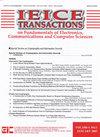Properties of <i>k</i>-bit Delay Decodable Codes
IF 0.4
4区 计算机科学
Q4 COMPUTER SCIENCE, HARDWARE & ARCHITECTURE
Ieice Transactions on Fundamentals of Electronics Communications and Computer Sciences
Pub Date : 2023-01-01
DOI:10.1587/transfun.2023tap0016
引用次数: 0
Abstract
The class of k-bit delay decodable codes, source codes allowing decoding delay of at most k bits for k ≥ 0, can attain a shorter average codeword length than Huffman codes. This paper discusses the general properties of the class of k-bit delay decodable codes with a finite number of code tables and proves two theorems which enable us to limit the scope of codes to be considered when discussing optimal k-bit delay decodable codes.<i>k</i>-位延迟可解码码的性质
k位延迟可解码码,即在k≥0时允许最多k位解码延迟的源代码,可以获得比霍夫曼码更短的平均码字长度。本文讨论了具有有限码表的k位延迟可解码码的一般性质,并证明了两个定理,使我们在讨论最优k位延迟可解码码时能够限制所考虑的码的范围。
本文章由计算机程序翻译,如有差异,请以英文原文为准。
求助全文
约1分钟内获得全文
求助全文
来源期刊

CiteScore
1.10
自引率
20.00%
发文量
137
审稿时长
3.9 months
期刊介绍:
Includes reports on research, developments, and examinations performed by the Society''s members for the specific fields shown in the category list such as detailed below, the contents of which may advance the development of science and industry:
(1) Reports on new theories, experiments with new contents, or extensions of and supplements to conventional theories and experiments.
(2) Reports on development of measurement technology and various applied technologies.
(3) Reports on the planning, design, manufacture, testing, or operation of facilities, machinery, parts, materials, etc.
(4) Presentation of new methods, suggestion of new angles, ideas, systematization, software, or any new facts regarding the above.
 求助内容:
求助内容: 应助结果提醒方式:
应助结果提醒方式:


